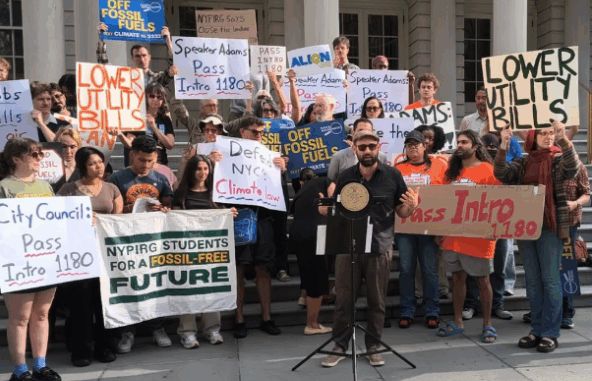
BY SARAH O’CONNELL
On September 29, climate activists rallied at New York City Hall to call for the passage of Intro 1180, which would close a loophole in New York City’s landmark emissions law.
In 2019, New York City enacted Local Law 97, placing limits on carbon emissions for large buildings. The law was described as the most ambitious building emission legislation passed by any city in the world. But a loophole created by Mayor Eric Adams allows building owners to circumvent lowering pollution levels through the purchase of Renewable Energy Credits (RECs), a certificate representing one megawatt hour of green energy going to the electricity grid.
The law, signed by Mayor Bill de Blasio as part of his “Green New Deal,” targets NYC’s approximately 50,000 buildings over 25,000 square feet, which are New York City’s top source of pollution. The compliance period began in January 2024, with the pollution limit tightening every five years thereafter until the zero-emission target is reached in 2050. Critics warn that as long as the loophole is in place, this target may not be reached.
“Corrupt Mayor Adams, at the behest of the real estate lobby, administratively gutted the law, allowing polluting landlords to purchase compliance instead of actually eliminating pollution.” Ken Schles, a Volunteer Leader at Food and Water Watch, a nonprofit focusing on food and water justice, said during the rally. “It’s past time to make a stand against the multi-headed crisis of corrupted democracy.”
During the rule-making period, Mayor Adams ignored advice from the law’s advisory council that he put a tight cap on the amount of emissions that could be offset through RECs. Instead, the loophole allows building owners to offset about 50% of the pollution they would have to clean up to comply with the 2030 emissions cap.
Since being sworn in in 2022, Mayor Adams has faced repeated scandals, most notably his indictment on federal corruption charges in September 2024. The charges were later dismissed, and despite his low approval ratings, he ran for reelection. The day before the rally, Adams announced he was abandoning his reelection campaign, citing low polling numbers and the Campaign Finance Board’s withholding of millions of dollars of matching funds.
According to a Memorandum in support of Intro 1180, the impact of the loophole could have major effects on New Yorkers – including the loss of tens of thousands of jobs, millions of tons of increased pollution, and increased utility bills.
Another speaker at the rally was Damien Andrade, Campus Project Coordinator at the New York Public Interest Research Group (NYPIRG), a nonprofit research and public education organization. Andrade warned of the impact the uncapped pollution offsets could have, saying “This is an environmental issue, a public health issue, and it’s an economic issue. When wealthy building owners are free to write blank checks on air pollution, it’s the lower-income New Yorkers, particularly communities of color, that are paying that price.”
Building owners have voiced concerns over the financial impact of retrofitting buildings to be in compliance with the narrower 2030 emissions limit, with a group of Queens property owners unsuccessfully suing the city in an attempt to overturn Local Law 97. Since only large buildings are subject to the law, we “know they have the money,” said Andrade. For every metric ton of emission above the limit, building owners are fined $268 annually.
Intro 1180 was introduced to the City Council in February of 2025. As of October, it remains in Committee. According to Eric Weltman, Senior Organizer at Food and Water Watch, the group strives to pass the bill by the end of the year, but will continue its efforts if not successful.
